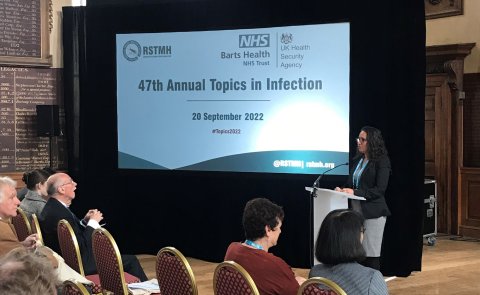Topics in Infection 2022

Last month we held our 47th Annual Topics in Infection meeting – a one day event delivered as a partnership between RSTMH, Barts Health and the UK Health Security Agency. It brought together microbiologists, infectious disease physicians, infection control personnel and biomedical and clinical scientists to hear updates on recent “hot topics” in all aspects of infectious disease in the UK.
We have chosen a few highlights to share with you from the day. Pease consider buying the video of the event if you would like to hear more from many of the speakers. The video contains the talks from the following speakers:
- Jimmy Whitworth on Monkeypox
- Professor Judith Breuer on childhood hepatitis
- Dr Rita Browne on impacts of COVID-19 on sexual health
- Dame Professor Jenny Harries OBE on preparing for next winter
Preparing for next winter
Speaking first was Professor Dame Jenny Harries OBE, Chief Executive of the UK Health Security Agency, who provided an update on the next UK winter in light of flu and other virus trends.
Dame Jenny mentioned that the Australian flu season was a high concern, with the country seeing high rates in children and young people, and high admission rates at the start, although this had tapered off towards the end of the season.
She reminded us that this is the first winter with no restrictions since the COVID-19 pandemic, and that we may have less immunity to flu given that we have had less circulation. There are also additional risks of vaccines waning and the likelihood of the Australian flu making its way to the UK. These factors make the winter flu season harder to predict.
With 33 million individuals eligible for the flu vaccine this year as well as 26 million for the covid vaccine, she mentioned we are starting from a good place. She ended with the critical message that anyone who is eligible should get their vaccine.
Monkeypox
Professor Jimmy Whitworth presented on the ‘unprecedented epidemic of monkeypox’. He spoke about the history of the current and previous outbreaks, including its classification as a Public Health Emergency of International Concern by the WHO, the highest level of alert that the UN health body can give.
Professor Whitworth said that although the PHEIC criteria were met, the necessary tools for control were known and available, and case numbers were plateauing or falling off. He said that the disease severity was fairly low, with few deaths, however there were some severe cases and its high profile exacerbated stigma and discrimination against communities at risk.
COVID-19 and sexual health
Dr Rita Brown, a Consultant of Genito-Urinary Medicine, spoke about the impact of the coronavirus pandemic on sexual health. She mentioned the move to virtual appointments and prescriptions led to a 25% decrease in 2020 of sexual health testing, in comparison to 2019.
She noted they there was a 32% decrease in STI diagnoses and a 25% decrease in STI testing in England, meaning the COVID-19 pandemic had a significant impact on access to testing. With testing predominantly online limiting access to high risk groups and symptomatic testing.
COVID-19 and acute myocardial injury
Dr Oliver Guttman and Professor Saidi (Sam) Mohiddin from Barts Health NHS Trust presented on acute myocardial injury and its relationship with COVID-19 and the COVID-19 vaccine.
Myocarditis, which is inflammation of the heart muscle but covers a broad category of diagnosis, is a disease seen across all age groups, but is one that is particularly seen in young people.
They reported that, although rare, there are instances of myocarditis following COVID-19 vaccinations. They said however that other vaccines have been seen to cause myocarditis, such as the MRA vaccine.
Dogs detecting disease
Professor James Logan presented on the use of dogs and sensors to detect disease. He spoke about how dogs have an incredible sense of smell and can be trained. It is for this reason that he and his colleagues conducted their research to see if dogs could be trained to detect COVID-19.
Through the testing they found that some dogs perform better than others, but that some had a success rate as high as 94%.
Professor Logan said this means that 2 dogs can screen 300 people for COVID-19 within 30 minutes, suggesting it is possible that they could be used in mass gatherings. He said that dogs are accurate, affordable and accessible, as well as having no safety issues and being sustainable and cost-effective.
Poliovirus detection in London sewage
Dr Rebecca Cordery, a Consultant in Communicable Disease Control with the UKHSA, presented on the presence of Poliovirus in London’s sewages.
She said that although Polio has almost been entirely eradicated, with Afghanistan and Pakistan the two last countries where wild types can be found, there has been an increase in presence of vaccine-derived Polio, which has been discovered in New York as well as London.
She said that sewage systems are used as part of surveillance, with regular sampling for pathogens being undertaken. In February 2022, vaccine derived polio was picked up in and has persistently reappeared since then. She said that all the samples had been related to the same strain, so it is from a vaccination campaign. Dr Cordery said that they have seen wider transmission in an unvaccinated area.
One Health
The last session of the day at the 47th Topics in Infection meeting was a panel discussion on One Health, which featured Professor Isabel Oliver, Chief Scientific Officer for the UKHSA, Professor Rick Mumford, Deputy Chief Scientific Advisor and Deputy Director of Science, Evidence and Research at the Food Standards Agency, and Professor Stuart Reid, President and Principal of The Royal Voluntary College.
Themes discussed included the need for a system that allows shared data, with the aim to pilot a better national surveillance system, as well as better connections across academia and a better understanding of consumers.
You can purchase the package of recorded sessions from 47th Annual Topics in Infection here.
